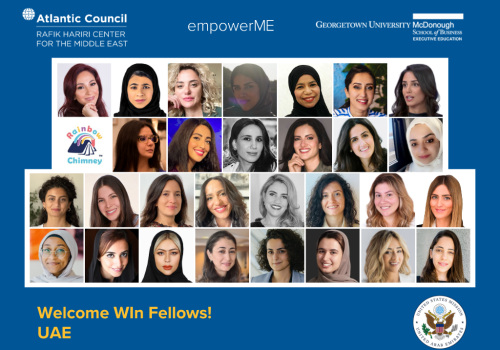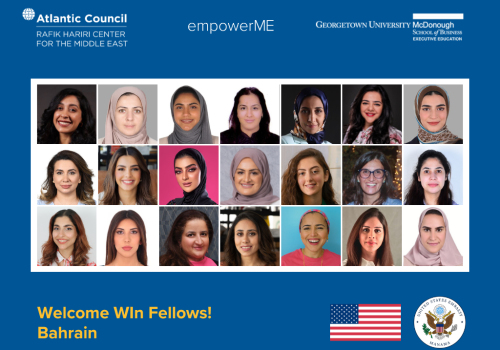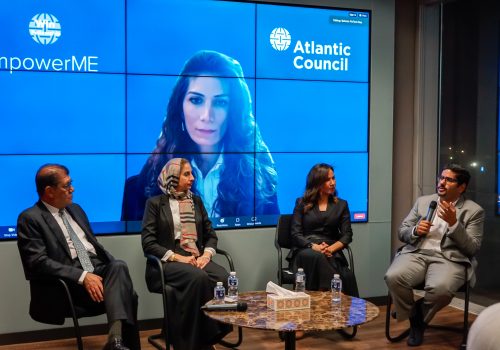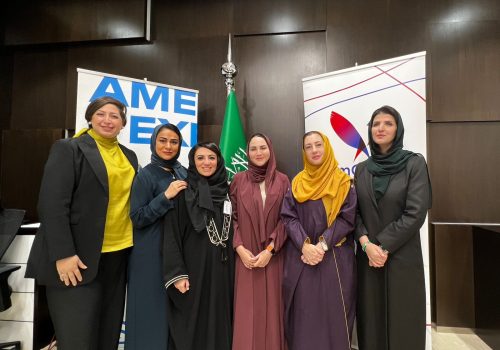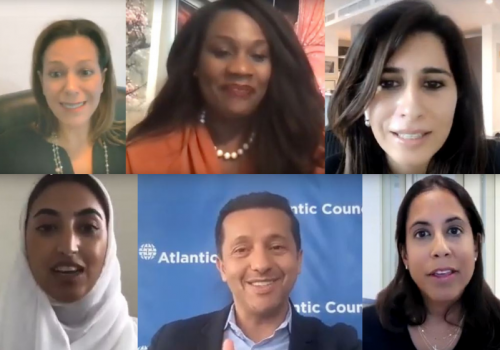Key strategies for Bahraini women entrepreneurs to scale their businesses across the MENA region
On February 7th, the Atlantic Council’s WIn Fellowship, in collaboration with Bahrain FinTech Bay, held a workshop exploring the best strategies for Bahraini women entrepreneurs to navigate business scalability across the region while attracting investors.
The panel, which was moderated by Ameera Mohamed, Senior Associate at Bahrain FinTech Bay, featured three successful executives with expertise in scaling businesses and navigating the venture capital landscape: Nawaf Mohamed Alkoheji, Chief Executive Officer at Tenmou; Omar Rifai, Co-Founder and Chief Growth Officer at GrubTech; and Chef Roaya Saleh, President and Founder of Villa Mamas Restaurant Group. To kick off the discussion, Lynn Monzer, Deputy Director of the WIn Fellowship, provided the opening remarks, while Nour Dabboussi, Assistant Director of the WIn Fellowship, concluded the event with some closing remarks.
Drawing upon their experiences as both founders and investors, the panelists highlighted the best practices for entering a new marketplace, including conducting market research, proactively considering early operations, and preserving a company’s vision and goals while making the shift. Key to the discussion were lessons learned from the panelists’ experiences with scaling projects, wherein opportunities arose as often as challenges.
Lynn Monzer opened the event by noting the sixteen-fold increase in start-up investment in the Middle East and North Africa (MENA) region since 2015, with $4 billion raised in 2023. The growth that was further augmented by a 30 percent increase in exits through mergers and acquisitions from 2022. This trend underscores the resiliency of the region and its ability to navigate complex economic and political challenges, all while laying a foundation for future entrepreneurs. Monzer concluded by highlighting the importance of scalability in reaching new markets and generating innovation while retaining a business’ core values and mission.
Main Takeaways
Chef Roaya Saleh discussed the importance of retaining her business’ distinct identity outside of Bahrain and preserving Bahraini culture as purveyor of local cuisine. She emphasized a shared set of values and common mission among all employees within her restaurants. On expanding beyond the GCC, Saleh recalled overcoming challenges by staying focused on the core vision of the business and learning from inevitable mistakes. Nawaf Mohamed Alkoheji then spoke on his career as an angel investor and listed some of the green flags that his company seeks in prospective partners, such as business models incorporating new technologies. Investors spend much of their due diligence evaluating founders, seeking individuals who can deliver on the visions they propose. Alkoheji also advised entrepreneurs to be mindful of the characteristics of their new markets, as businesses must fit their markets to be successful.
Alkoheji then emphasized the importance of consolidating control over a home market before launching into another. Roaya Saleh concurred with her colleague, adding that entrepreneurs must also have an exit strategy in mind in case things don’t go as planned. From his experience as an investor, Omar Rifai recounted that a common mistake made by successful founders was expanding too quickly, and advised new entrepreneurs not fall into the same trap. There is a learning curve inherent to scaling, and companies must be ready to adapt to new challenges when they first make the leap.
As for the challenges and opportunities that come with scaling up, Roaya Saleh recalled the predatory behavior of some investors who have tried to convince founders to expand prematurely. She attributed her success to her ethos and principles as much as good financial breaks. Omar Rifai identified niches in the food and beverage value chain where entrepreneurs have yet to integrate digital infrastructure, illustrating a decision point for companies hoping to scale up; businesses can choose to either capture more of their value chain, or increase their competitive edge through adopting tech innovations. Thus, challenges faced at the entrance of new markets can rapidly become opportunities if entrepreneurs think creatively.
On policy prescriptions for driving more investment to Bahraini companies, Nawaf Mohamed Alkoheji suggested that the government should incentivize successful Bahrainis to reinvest their capital in other local firms. Attracting more investors to a market is a positive development for all start-ups therein.
The panelists then delved more into their experiences landing in new markets. Roaya Saleh shared her experience expanding Villa Mamas into Europe. Omar Rifai recounted that GrubTech’s entry into Egypt was initially a failure, as local restaurants did not purchase the company’s software. However, the company still gained from lessons learned in market research and by hiring some forty employees for global administrative operations. Both cases revealed some of the challenges entrepreneurs face when entering new marketplaces, but through these examples, Rifai emphasized the need for entrepreneurs to conduct smart research on new markets, both remotely and by spending time on the ground there.
Nawaf Mohamed Alkoheji discussed attributes that make Bahrain an attractive market. For example, encouraging foreign entrepreneurs to grow their start-up in the Kingdom is feasible thanks to the cheaper costs of launching there. Roaya Saleh and Ameera Mohamed also highlighted the close nature and welcoming spirit of the country’s start up ecosystem. Saleh also noted a benefit of the tight community in that allows for rapid customer feedback, allowing brands to forge close relationships with customers.
The Way Forward
Bahraini support for SMEs continues to deliver remarkable results, with the sector growing 14 percent last year; 39 percent of these enterprises are now woman-owned. The boom is fueled in part by entrepreneurship initiatives launched by the government’s Economic Development Board, such as Fintech hubs and seed fuel programs. The Kingdom is also continuing to position itself as a regional leader in start-up launches, the number of which has grown at a compound annual growth rate of 46.2 percent over the past three years.
With foreign capital inflows continuing to surge and ever-greater numbers of new businesses entering the country’s markets, the time is right for Bahraini entrepreneurs to consider scaling beyond the Kingdom. Making the leap is made easier by learning from others who came before, and successful founders and investors have much of the same advice to pass along to companies wishing to expand. They stress the importance of picking the right moment to scale up, as overstretching a business too early can doom the whole enterprise. Researching the characteristics of a new market and investing carefully can similarly mitigate risk. Challenges in new markets can be turned into opportunities, so long as founders can strike a balance between adapting their business and retaining their vision.
It is critical that the Kingdom continues to nourish its startup ecosystem through attracting foreign investment and founders, as well as through facilitating spaces where new entrepreneurs can synergize and learn from one another.
Explore the WIn Fellowship
Recommended content
Sponsors & in-country partner


empowerME
empowerME at the Atlantic Council’s Rafik Hariri Center for the Middle East is shaping solutions to empower entrepreneurs, women, and youth and building coalitions of public and private partnerships to drive regional economic integration, prosperity, and job creation.

